☰
VOLUME LVIII | OCT 2021
Technology’s impact on worker well-being
In the traditional narrative of the evolving 21st century workplace, technological substitution of human employees is treated as a serious concern, while technological complementarity — the use of automation and artificial intelligence to complement workers — is viewed as a good thing. But a new study tells a more nuanced story, demonstrating that the integration of automation and AI in the workplace has mixed, even negative impacts, on worker wellbeing.
Marc Harper
Marc is a Canadian exercise physiologist in St. John’s, linking fitness to sharper thinking. He writes about real-world ways to stay strong and sharp, inspired by Newfoundland’s tough, no-frills lifestyle.

